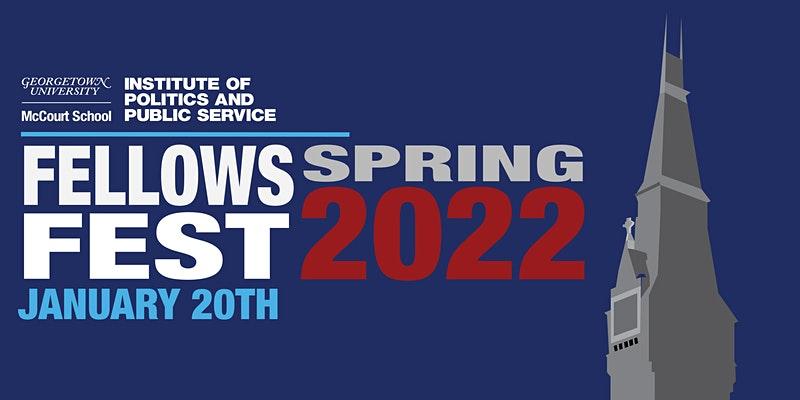The Georgetown Institute of Politics and Public Service (GU Politics) fellows for the spring 2022 semester introduced themselves to the Georgetown community during a moderated panel discussion at the Fellows Fest on Jan. 20.
The virtual Fellows Fest, hosted by GU politics, focused on topics including the state of United States politics and the extent to which the media play a role in the rise of ideological polarization. Ashley Etienne, Alyssa Farah Griffin, Dafna Linzer, Wesley Lowery, Kristen Soltis Anderson and Elliot Williams — the spring 2022 GU Politics fellows — are experts in the fields of government, politics, communications, journalism, media and law. They will meet with Georgetown students over the course of the semester in student strategy teams, discussion groups and office hours to discuss politics and ideas about improving the U.S. political system.
According to a Pew Research Center study, 77% of Americans think that the U.S. is more divided than it was before the start of the COVID-19 pandemic. Furthermore, the Pew Research Center reports that partisan polarization in regards to trusting media services has increased significantly since 2015.

Partisan news media is driven by the profit it brings in as a result of heightened viewership, according to Lowery, Pulitzer Prize-winning journalist and correspondent for 60 Minutes+, the streaming version of CBS’s 60 Minutes program.
“When we look at all of the news outlets, we now see an explicitly partisan press that is in many ways the norm,” Lowery said at the event. “As we think about these things, I think we have to grapple with what does that mean in a world where perhaps some level of partisan press is inevitable when it’s what the people want when they vote with their wallets and their clicks.”
One way to avoid political polarization is to ensure that individuals get their news from a wide variety of sources, according to Linzer, former managing editor for politics at NBC News and MSNBC.
“One of my biggest things that I try to encourage people to do as media consumers is to have a well-balanced diet,” Linzer said. “Don’t just stick to one channel or one outlet. If you really care about a topic, try to find all the different kinds of points of view.”
The cohort of fellows discussed the aftermath of the Jan. 6 insurrection, in which a group of supporters of former President Donald Trump and extremists broke into the U.S. Capitol building in an attempt to overturn the 2020 presidential election results.
According to Farah Griffin, former White House communications director for the Trump administration, the Jan. 6 attack demonstrates the threat of the spread of disinformation to democracy.
“To see our institutions being pushed to the brink because partisanship and hyper-partisanship had run so rampant and because disinformation was spread so wildly is something that we have to tackle,” Farah Griffin said.
Disinformation was a direct cause of the Jan. 6 attack and continues to fuel political division in the U.S., according to Etienne, former communications director to Vice President Kamala Harris and former communications director to Speaker of the House Nancy Pelosi (D-Calif.).
“It’s perpetuating this division in our nation, and the forces are internal and external. I think that is a major factor,” Etienne said. “There are people who still dispute whether or not Jan. 6 actually even happened — people who were in the building.”
The way to make progress on social issues and move forward is to end the demonization of political groups and the spread of disinformation, according to Soltis Anderson, Republican pollster and co-founder of Echelon Insights, an opinion research and analytics firm.
“The problem isn’t that we disagree with one another in big ways on things like debt or spending or what the role of government should be or culture or what have you,” Soltis Anderson said. “The problem is that increasingly we view the other side not just as wrong but as a grave threat.”
The spring 2022 fellows will host weekly discussion sections with students beginning the week of Jan. 31.




















